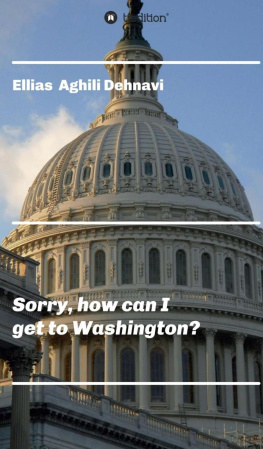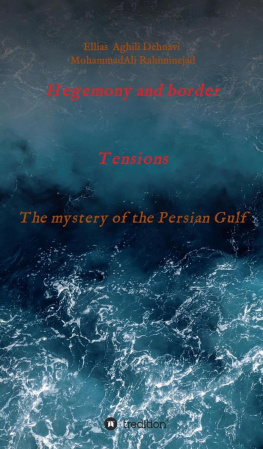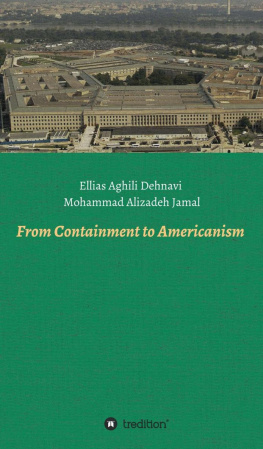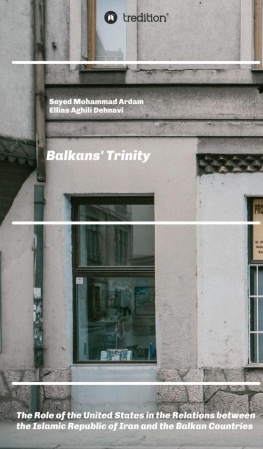Copyright 2020 Ellias Aghili Dehnavi
Publisher: tredition GmbH, Halenreie 40-44, 22359 Hamburg, Germany
ISBN
Paperback: | 978-3-347-04949-9 |
Hardcover: | 978-3-347-04950-5 |
eBook: | 978-3-347-04951-2 |
Printed on demand in many countries
All rights reserved. No part of this publication may be reproduced, distributed, or transmitted in any form or by any means, including photocopying, recording, or other electronic or mechanical methods, without the prior written permission of the publisher, except in the case of brief quotations embodied in critical reviews and certain other noncommercial uses permitted by copyright law. For permission requests, write to the publisher.
Sorry, how can I get to Washington?
I dedicate this splendid analytical work to my family in Germany:
Johannes, Regina, Roland and Anna who showed me the path to salvation!
Preface
Investigating relations of Iran and USA over the past four decades has been significant for a variety of reasons, including numerous domestic and regional atrocities. Foreign relations between Iran and the United States after the Islamic Revolution is one of the most complex issues with its ups and downs. The main question raised in this book is "how foreign policy and relations between the two countries have been in different periods since the Islamic Revolution and how can it be explained?" The present study is a descriptive-analytic one and uses different styles including library method to investigate the mentioned question. The results of my research shows that the relations between Iran and the United States have been greatly affected by various variables over the past four decades: The Iran-USA relationship comes from the ideology stemming from the Islamic Revolution and the historical preservation of Iranian society from USA's interference in their domestic affairs (such as the coup d'etat in Mordad 28th) and the occupation of the USA embassy in Iran by students following the line of Imam and hostage-taking, and recently the nuclear case. Iran and the United States have been in a variety of complex situations since the victory of the revolution, including war, strife, conflict, peace and negotiation. At one point, USA foreign policy is based on regime change, at other times changing behavior through dialogue or the imposition of tough sanctions. Within Iran, regarding the different governments and different time requirements, different approaches have been taken to Iran's foreign policy toward the United States. At some points, the emphasis has been on deterioration and negosiation, and at other times a policy of resistance and non-negosiation has been adopted.
Keywords: Islamic Revolution, Iran, USA, Hostage, Nuclear Case, Conflict, Negotiation.
1- Introduction
The Islamic Revolution in its first declaration of existence was in stark contrast to the divisive circle of power in its time. This led the Islamic Republic of Iran to face hostility from major powers, especially the United States. With the collapse of the Soviet Union, the United States turned its full power on both the software and hardware to confront the Islamic Republic of Iran. Therefore, the Islamic Republic of Iran has faced numerous challenges and tensions with the governments of the United States of America since its establishment. The Islamic Revolution of Iran succeeded in 1979, when its nature was in stark contrast to the bipolar structure of the international system. The essence of the foreign policy of the Islamic Republic of Iran was organized according to the slogan "No Eastern, not Western, just Islamic Republic" and thus sought to deconstruct and break the rules of the game governing of the international structure and the Middle East. The relationship between Iran and the United States after the Islamic Revolution has led to mutual conflicts and challenges that have continued to this day under the influence of various variables. With the victory of the Islamic Revolution, the White House not only lost its strategic ally in the Middle East, but also faced the flushing of anti-American and anti-American views and slogans. The Islamic Republic's fledgling system, for its own growth and pursuit of the principles of "Independence, Freedom and the Islamic Republic," entered into an ideological confrontation with the United States of America. On the other hand, the United States also equated the collapse of the Islamic Republic with the consolidation of its position in the world, and especially in the Middle East. From this point of view, the conditions of confilict caused by opposition, hostility, negation, nihilism and violence have always existed in the USA-Iran relations. Considering more than four decades after the Islamic Revolution and the breakdown of USA-Iranian relations following the USA embassy occupancy in Tehran, there is not only a sure sign of a thaw in relations between the two countries, but in some cases even worse scenarios, such as military confrontation. Considering the current state of relations between Iran and the United States, the study of the relations between these two after the victory of the Islamic Revolution is the case of this study.
2- Iran-USA relations during the period of Caretaker government
Early in the victory of the Islamic Revolution, there were gradually two general views on how to communicate with the United States:
(a) Interaction with the United States: This view was put forward by the intellectual and executive elite of the Provisional Government and political and intellectual currents close to Bazargan. Ibrahim Yazdi, the foreign minister at the time, believed that the Iranians considering technology needed to have connection with the West, especially the United States. "Dr. Ibrahim Yazdi, when he was deputy prime minister, announced that Iran was going to need USA technology over time." One week after the victory of the Islamic Revolution, Bazargan declared: "The Iranian revolutionary government is eager to resume its relations with the United States" (Azgandi, 2).
(b) Confrontation with the United States: The source of the Iranian confrontation with USA power politics is as follows: 1. It is Iran's desire for independence, self-reliance, and independent identity that rejects any need for America. Iran's desire for domestic independence is in line with its desire for international independence, by which Iran can be East or West, both East and West or no East and no West, whether the USA wants it or not. Iran's deep conviction that Iran is alongside the "militant Muslim Ummah," to engage in international and regional Islamic issues, including defending Islam, the Islamic Ummah, and Islamic ideals (Rex, 200: 477).
Various political and intellectual groups and currents in the Islamic Revolution believe in confrontation with the United States, which suffices to mention three examples: Islamic Clerics: The Islamic clergy considered the United States of America more harmful to Islam than any other foreign power in the past, and certainly more harmful than the Soviet Union could have been. Moreover, Moscow could only infiltrate Iran with the use of force of arms and a small revolutionary group affiliated with the pro-Soviet Tudeh Party.
There was no cultural threat caused by Moscow because the Soviet lifestyle was not tempting for Iranians. On the other hand, the United States was a major cultural threat forto Islam: popular American culture, along with worldly attitudes, emphasis on individualism in the community, pursuit of personal satisfaction, norms and sexual orientation, and consumerist lifestyles and the international and pervasive character of the American mass media were all promoted in Iran, as a commodity of great enthusiasm. Iranian western students and aliens were alienated from traditional values and Islamic culture and assimilated into the American way of life. They consider the American clergy as the torchbearer of not knowing god cultur that posed a serious threat to Islam. Imam Khomeini repeatedly complained about this acceptance of American culture as "American Islam" (Fuller, 2008: 290).











